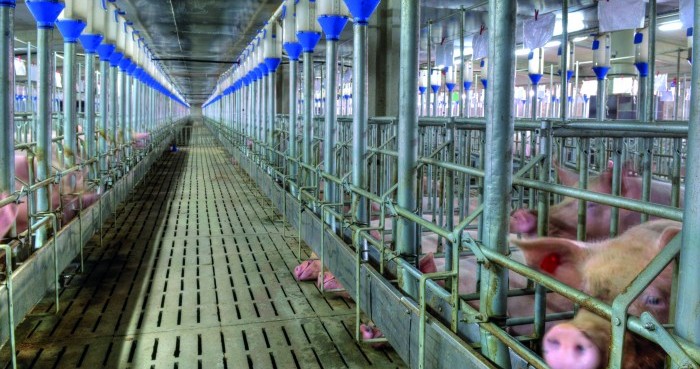After years of delays, a California law preventing breeding pigs being kept in narrow cages has now come into force.
Associated Press report that the new rules state that breeding sows cannot be kept in gestational crates which prevent them from standing or turning. In-store stock of pork produce will take six months to catch up with the law, however, because while the U.S. Supreme Court upheld the law, the state recently agreed to allow pork slaughtered before July 1 to be sold in California markets and restaurants for the rest of the year, giving farmers and retailers time to adjust.
Despite some corners expressing frustration about further delays to the law voted in four years ago, there are some backers of the new law who have agreed that the delay is beneficial to the market as a whole. Josh Balk, who led the Humane Society of the United States’ campaign to pass the law, said: “There’s going to be a smooth transition for the pork industry.”
Egg-laying hens and veal calves are also included in the new rules, but the pork industry filed legal challenges against the measures. They argued that California, which consumes around 13% of the nation’s pork but produces almost none of it, shouldn’t dictate how farmers in other areas of the country should raise their livestock.
Voters in California approved Proposition 12 in 2018, mandating that fresh pork sold in their state had to be born to sows with at least 24 square feet of space, allowing a breeding pig to turn around and extend its limbs. Producers argued that converting barns to comply would be costly, with standard operations paying $5 million to $15 million. Larger spaces would also mean higher heating and maintenance costs.
Pork producers also defended their treatment of pigs, arguing the law wasn’t based on science, but the Supreme Court upheld the ruling.
Some California retailers do not anticipate much disruption, but others are concerned, even with the latest delay in the regulations, said Ronald Fong, CEO of the California Grocers Association. Bacon is likely to remain well stocked because it can be frozen. But fresh products could be in shorter supply. He said: “Pork chops, pork loin, pork roast, that are sold fresh, not frozen, those are the types of products that we can anticipate a disruption at some level.”




